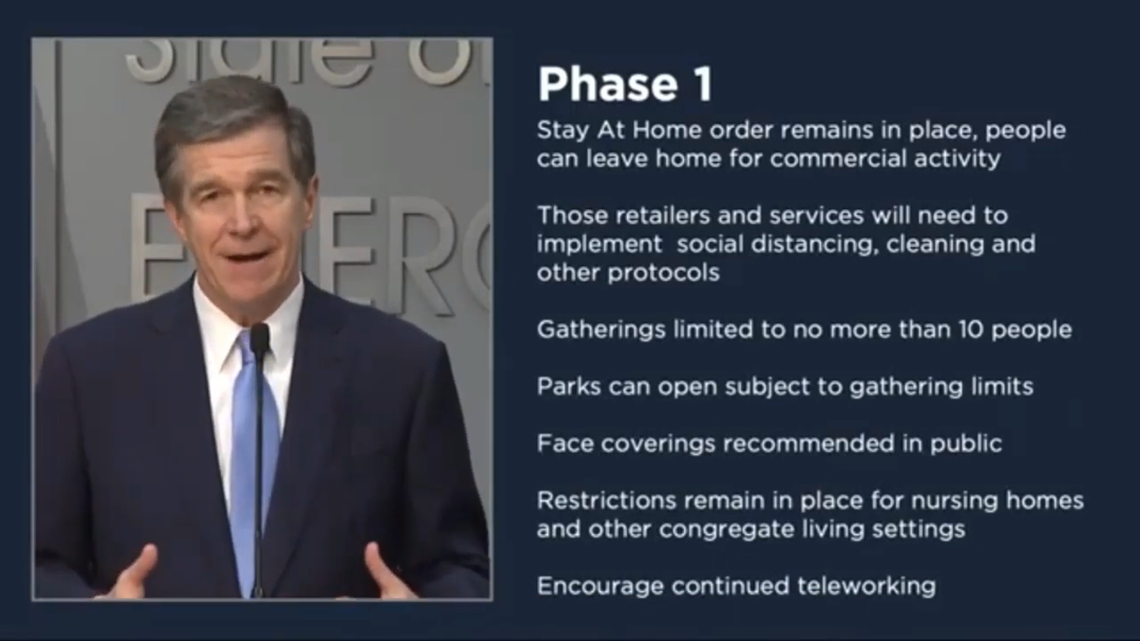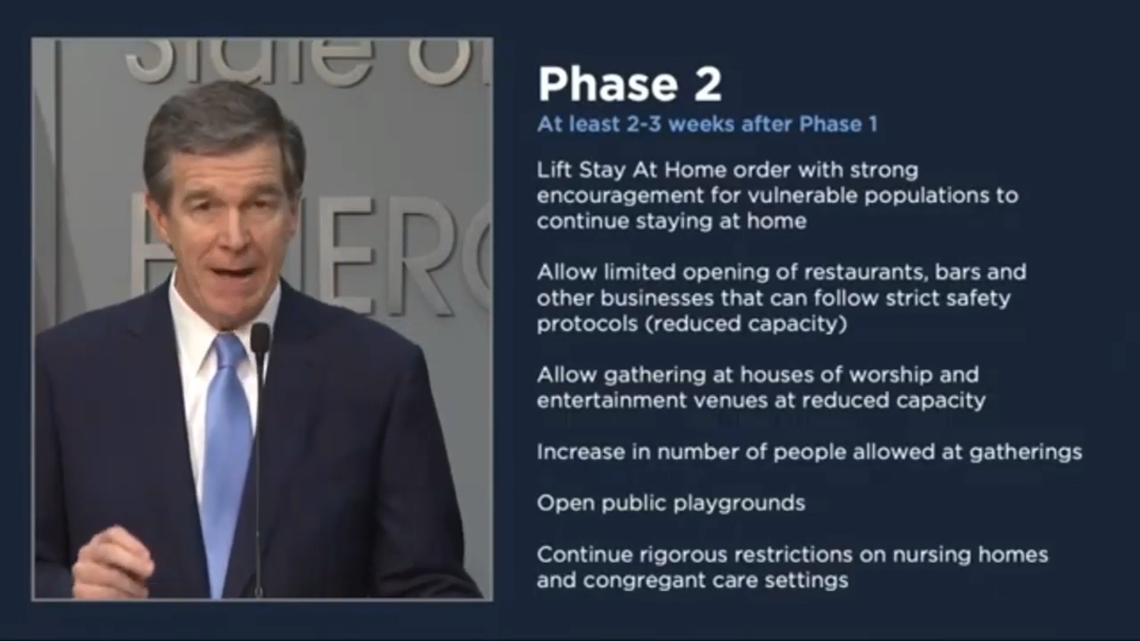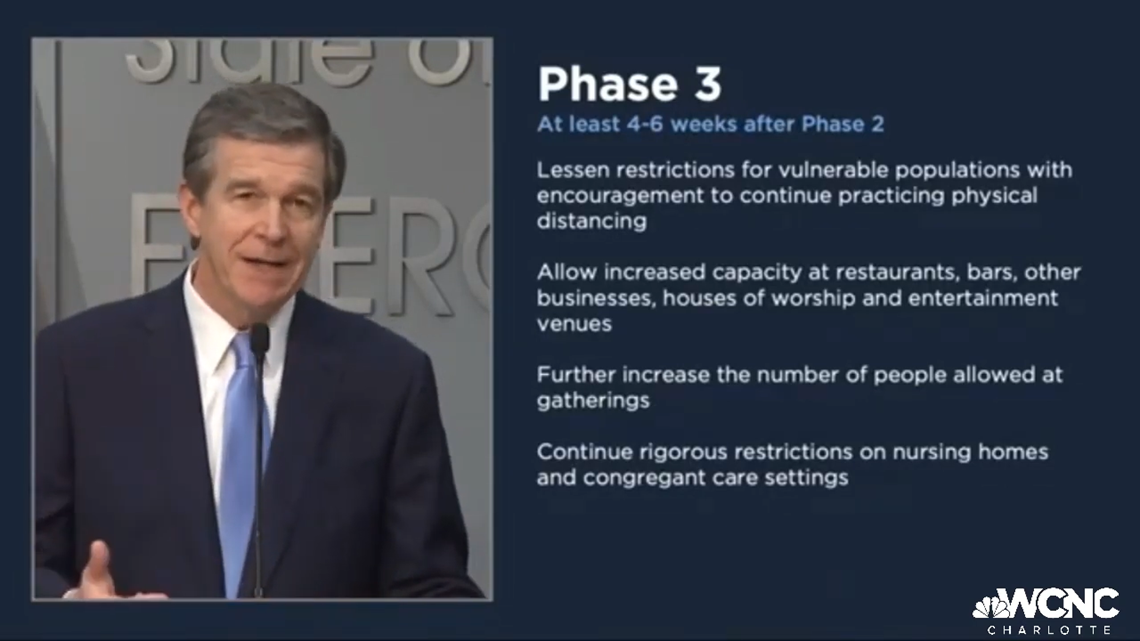RALEIGH, N.C. — North Carolina Governor Roy Cooper announced Thursday an extension of the state's "stay home" order until May 8 due to the ongoing impacts from the COVID-19 coronavirus. The order was originally supposed to end on April 29.
"After a thorough analysis of the details of testing, tracing and trends, it's clear that we are flattening the curve but our state is not ready to lift restrictions yet," Cooper said.
Cooper's order includes businesses that have been closed due to the risk of spreading the virus, such as nail salons, hair salons, dine-in restaurants and movie theaters.
In conjunction with the stay home extension, Cooper did outline his future plan for loosening coronavirus restrictions - but only when the data says it is safe to do so, he explained.
Dr. Mandy Cohen, Secretary of the North Carolina Department of Health and Human Services, said the state is watching four metrics when it comes to lifting social distancing restrictions. They are COVID-like symptomatic cases, lab-confirmed cases, positive tests as a percentage of total tests and hospitalizations. Each of these metrics are measured over a 14-day period.
"North Carolina is flattening the curve but we're not there yet," Dr. Cohen said.
The multi-step plan to loosen coronavirus restrictions will occur over several weeks. The governor outlined what will happen during each of those phases below.
Cooper also cautioned that the state could roll back to a previous phase if coronavirus conditions worsen during the process.
North Carolina reopening: Phase 1


- Modify the Stay At Home order allow travel not currently defined as essential allowing people to leave home for commercial activity at any business that is allowed to be open, such as clothing stores, sporting goods stores, book shops, houseware stores and other retailers.
- Ensure that any open stores implement appropriate employee and consumer social distancing, enhanced hygiene and cleaning protocols, symptom screening of employees, accommodations for vulnerable workers, and provide education to employees and workers to combat misinformation
- Continue to limit gatherings to no more than 10 people
- Reopen parks that have been closed subject to the same gathering limitation. Outdoor exercise will continue to be encouraged.
- Continue to recommend face coverings in public spaces when 6 feet of distancing isn’t possible
- Encourage employers to continue teleworking policies
- Continue rigorous restrictions on nursing homes and other congregant care settings
- Local emergency orders with more restrictive measures may remain in place.
North Carolina reopening: Phase 2
At least 2-3 weeks after Phase 1


- Lift Stay At Home order with strong encouragement for vulnerable populations to continue staying at home to stay safe
- Allow limited opening of restaurants, bars, fitness centers, personal care services, and other businesses that can follow safety protocols including the potential need to reduce capacity
- Allow gathering at places such as houses of worship and entertainment venues at reduced capacity
- Increase in number of people allowed at gatherings
- Open public playgrounds
- Continue rigorous restrictions on nursing homes and other congregant care settings
North Carolina reopening: Phase 3
At least 4-6 weeks after Phase 2


- Lessen restrictions for vulnerable populations with encouragement to continue practicing physical distancing and minimizing exposure to settings where distancing isn’t possible
- Allow increased capacity at restaurants, bars, other businesses, houses of worships, and entertainment venues
- Further increase the number of people allowed at gatherings
- Continue rigorous restrictions on nursing homes and other congregant care settings
“North Carolina cannot stay at home indefinitely,” added Governor Cooper. “We have to get more people back to work. Right now, the decision to stay at home is based on the public health data and White House guidance. North Carolina needs more time to slow the spread of this virus before we can safely begin lifting restrictions."
Mecklenburg County Manager Dena Diorio, who called for a two week extension of the stay home order Wednesday night, said Thursday that she is pleased with the governor's decision.
"Please [Governor Cooper] is keeping the Stay at Home Order in place," she tweeted. "It ensures countywide constituency, keeps the curve flattening and makes our communities safer."
Mecklenburg County extended their own, localized, and stricter order, through May 8.
To determine when the state moves onto the next phases, officials said they will be monitoring:
- Sustained Leveling or Decreased Trajectory in COVID-Like Illness (CLI) Surveillance Over 14 Days
Currently, North Carolina’s syndromic surveillance trend for COVID-like illness is decreasing over the last 14 days. - Sustained Leveling or Decreased Trajectory of Lab-Confirmed Cases Over 14 Days
Currently, North Carolina’s trajectory of lab-confirmed cases over the last 14 days cases is still increasing, although at a slower rate. - Sustained Leveling or Decreased Trajectory in Percent of Tests Returning Positive Over 14 Days
Currently, North Carolina’s trajectory in percent of tests returning positive over the last 14 days is increasing at a slow rate. - Sustained Leveling or Decreased Trajectory in Hospitalizations Over 14 Days
Currently, North Carolina’s trajectory of hospitalizations over the last 14 days is largely level with a slight trend upward.
Officials outlined the following steps they are taking to combat the ongoing pandemic.
- Increase in Laboratory Testing
Currently, North Carolina is testing approximately 2,500 to 3,000 people per day and is working to increase to at least 5,000 to 7,000 per day. - Increase in Tracing Capability
Currently, North Carolina has approximately 250 people doing contact tracing across its local health departments and is working to double this workforce to 500. - Availability of Personal Protective Equipment
The state is working to ensure there are adequate supplies to fulfill requests for critical PPE for at least 30 days. This includes face shields, gloves, gowns, N95 masks, and surgical and procedural masks. Currently the state has less than 30 days supply of gowns and N95 masks. Availability of PPE is calculated based on the average number of requests for the last 14 days compared to the supply that the state has on hand.
As of 3 p.m. Thursday, there are over 7,600 confirmed cases of coronavirus in the state and 253 people have died as a result of the virus.
RELATED: North Carolina expected to announce phased re-opening plan: Real-time updates Thursday, April 23

